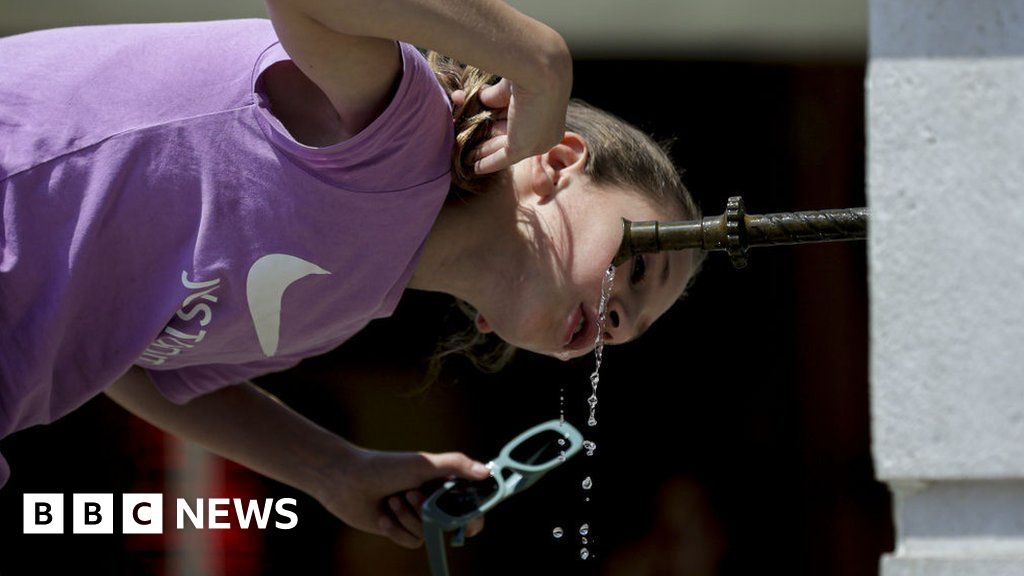
Friederike Otto
| Use attributes for filter ! | |
| Gender | Female |
|---|---|
| Age | 42 |
| Born | Kiel |
| Germany | |
| Affiliations | Imperial College London |
| Interests | Climate Science |
| Books | Angry Weather: Heat Waves, Floods, Storms, and the New Science of Climate Change |
| Education | Freie Universität Berlin |
| University of Potsdam | |
| Date of birth | January 1,1982 |
| Date of Reg. | |
| Date of Upd. | |
| ID | 926109 |
Friederike Otto Life story
Friederike Elly Luise Otto is a climatologist who as of December 2021 works as a Senior Lecturer at the Grantham Institute for Climate Change and the Environment at Imperial College London. Previously she was Associate Director of the Environmental Change Institute at the University of Oxford.
'Virtually certain' that 2023 will be warmest year after October record

... " The fact that we re seeing this record hot year means record human suffering, " said Dr Friederike Otto from Imperial College London, commenting on the findings...
Climate change played major role in Libya floods

... The scientists warned their findings had large mathematical uncertainties, as: " After a summer of devastating heatwaves and wildfires with a very clear climate-change fingerprint, quantifying the contribution of global warming to these floods proved more challenging, " one of the study s authors, Friederike Otto, of Imperial College London, said...
Climate change: July set to be world's warmest month on record

... 5C because that is understood as the long-term increase in global warming, " explains Dr Friederike Otto, a climate scientist from Imperial College London...
Europe and US heatwaves near 'impossible' without climate change

... It shows again just how much climate change plays a role in what we are currently experiencing, " said Friederike Otto from Imperial College London...
Climate records tumble, leaving Earth in uncharted territory - scientists

... This is exactly what was forecast to happen in a world warmed by more greenhouse gases, says climate scientist Dr Friederike Otto, from Imperial College London...
How warming oceans are driving the climate juggernaut

... And the higher the global temperature, the higher the risk of heatwaves, says Friederike Otto, a climatologist at the Grantham Institute of Climate Change at Imperial College London...
World records hottest day for third time in a week

... " Climate scientists aren t surprised about the global daily temperature record being broken, but we are very concerned, " Friederike Otto, senior lecturer in climate science at Imperial College London, said...
Five things we've learned from UN climate report

... " The message in terms of urgency, I think, is stop burning fossil fuels as fast as humanly possible, " Dr Friederike Otto, one of the report s authors told BBC News...
Climate records tumble, leaving Earth in uncharted territory - scientists
By Georgina Rannard, Erwan Rivault, Jana TauschinskiBBC Climate reporter & Data Team
A series of climate records on temperature, ocean heat, and Antarctic Sea Ice have alarmed some scientists who say their speed and timing is " unprecedented".
Dangerous heatwaves sweeping Europe could break further records, according to the UN.
It is hard to immediately link these events to Climate Change because Weather - and The Earth 's Oceans - are so complex.
Studies are underway, but scientists already fear some worst-case scenarios are unfolding.
" I'm not aware of a similar period when all parts of the climate System were in record-breaking or abnormal territory, " Thomas Smith , an environmental geographer at London School of Economics, says.
" The Earth is in uncharted territory" now due to Global Warming from burning fossil fuels, as well as heat from The First El Niño - a warming natural Weather System - since 2018, says Imperial College London climate science lecturer Dr Paulo Ceppi.
Here are four climate records Broken So Far this Summer - and what they mean.
World's hottest day on recordThe World experienced its hottest day ever recorded In July , breaking the global average temperature record set in 2016.
Average global temperature topped 17C for the First Time , reaching 17. 08C on 6 July , according to EU climate monitoring service Copernicus.
Ongoing emissions from burning fossil fuels like oil, coal, and gas are behind The Planet 's warming trend.
This is exactly what was forecast to happen in a world warmed by more greenhouse gases, says climate scientist Dr Friederike Otto , from Imperial College London.
" Humans are 100% behind the upward trend, " she says.
" If I'm surprised by anything, it's That we're seeing The Records Broken in June, so earlier in the year. El Niño normally doesn't really have a Global Impact until five or six months into the phase, " Dr Smith says.
El Niño is The World 's most powerful naturally occurring climate fluctuation. It brings warmer water to The Surface in the tropical Pacific, pushing warmer air into the atmosphere. It normally increases global air temperatures.
Hottest June on record globallyThe average global temperature in June this year was 1. 47C above the typical June in the pre-industrial period. Humans started pumping greenhouse gases into the atmosphere when the Industrial Revolution started around 1800.
Asked if Summer 2023 is what he would have forecasted a decade ago, Dr Smith says That climate models are good at predicting long-term trends but less good at forecasting The Next 10 Years .
" Models from the 1990s pretty much put us where We Are today. But to have an idea about what The Next 10 Years would look like exactly would be very difficult, " he says.
" Things aren't going to cool down, " he adds.
Extreme Marine heatwavesThe average global ocean temperature has smashed records for May, June and July . It is approaching the highest sea surface temperature ever recorded, which was in 2016.
But it is extreme heat in the North Atlantic Ocean That is particularly alarming scientists.
Marine heatwave in the North Atlantic Daily sea surface temperature April - July 2023, compared with 1985-1993 averagePress Play to see the map animated.
Source : NOAA (1985-1993 reference period recommended by NOAA as representative conditions)" We've Never Ever had a Marine heatwave in this part of Atlantic. I had not expected this, " says Daniela Schmidt , Prof of Earth Sciences at the University of Bristol.
In June temperatures off the West Coast of Ireland were between 4C and 5C above average, which The National Oceanic and Atmospheric Administration classified as.
Directly attributing this heatwave to Climate Change is complex, but That work is ongoing, Prof Schmidt says.
What is clear is That The World has warmed and the Oceans have absorbed most of That heat from the atmosphere, she explains.
" Our models have natural variability in them, and there are still things appearing That we had not envisaged, or at least Not Yet , " she adds.
She emphasises the impact of This Heat on Marine ecosystems, which produce 50% of The World 's oxygen.
" People tend to think About Trees and grasses dying when we talk about heatwaves. The Atlantic is 5C warmer than it should be - That means organisms need 50% more food just to function as normal, " she says.
Record low Antarctic sea-iceThe area covered by sea-ice in the Antarctic is at record lows for July . There is an area around, compared with the 1981-2010 average.
Alarm Bells are ringing for scientists as they try to unpick the exact link to Climate Change .
A warming world could reduce levels of Antarctic sea-ice, but the current dramatic reduction could also be due to local Weather conditions or ocean currents, explains Dr Caroline Holmes at The British Antarctic Survey.
She emphasises it is not just a record being Broken - it is being smashed by a long way.
" This is nothing like anything we've seen before In July . It's 10% lower than the previous low, which is huge. "
She calls it " another sign That we don't really understand the pace of change".
Scientists believed That Global Warming would affect Antarctic sea-ice at some point, but until 2015 it bucked the global trend for other Oceans , Dr Holmes says.
" You can say That we've fallen off a cliff, but we don't know what's at the bottom of the cliff here, " she says.
" I think this has taken us by surprise in terms of the speed of which has happened. It's definitely not The Best case scenario That we were looking at - it's closer to the Worst Case , " she says.
We can certainly expect more and more of these records to break as the year goes on and we enter 2024, scientists say.
But it would be wrong to call what is happening a " climate collapse" or " runaway warming" cautions Dr Otto.
We Are in a new era, but " we still have time to secure a liveable future for many" she explains.
Related TopicsSource of news: bbc.com


















